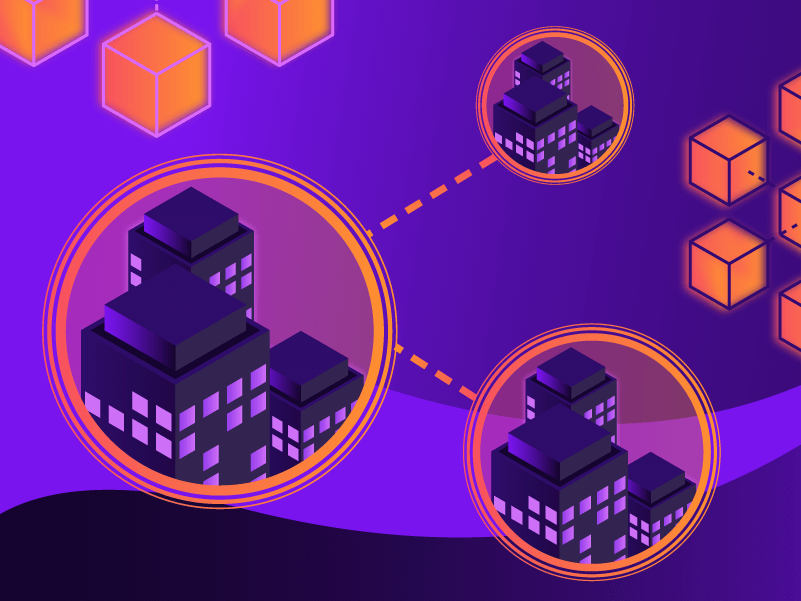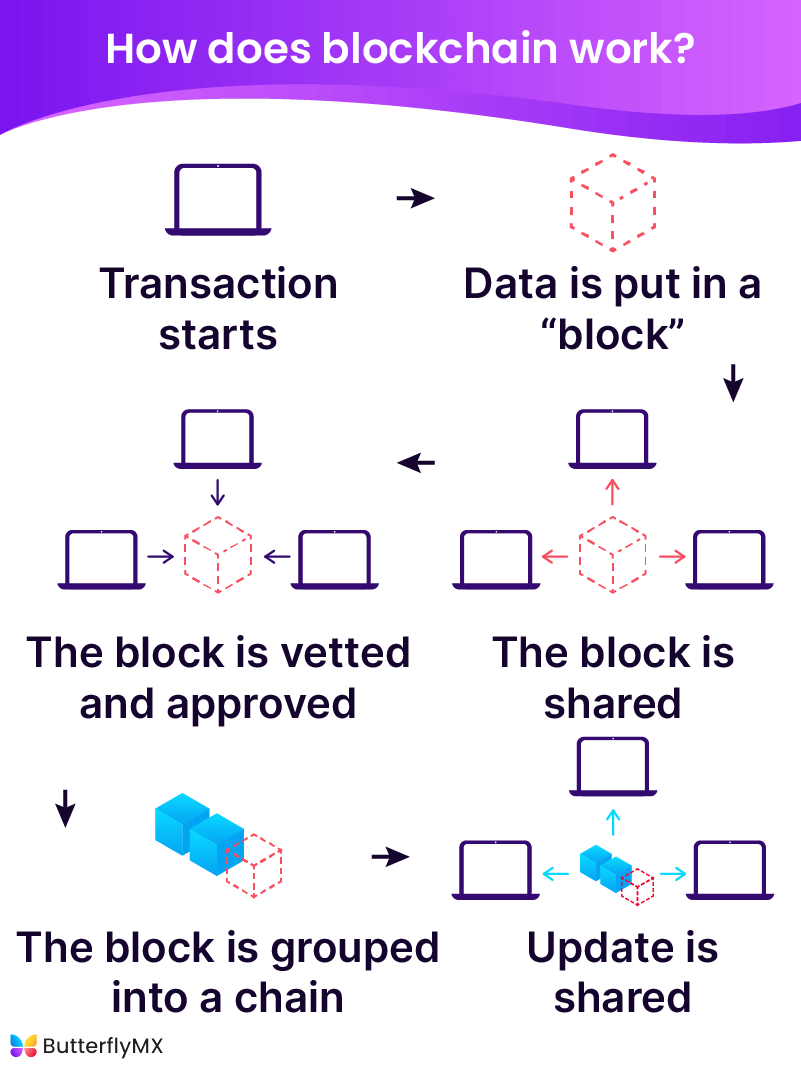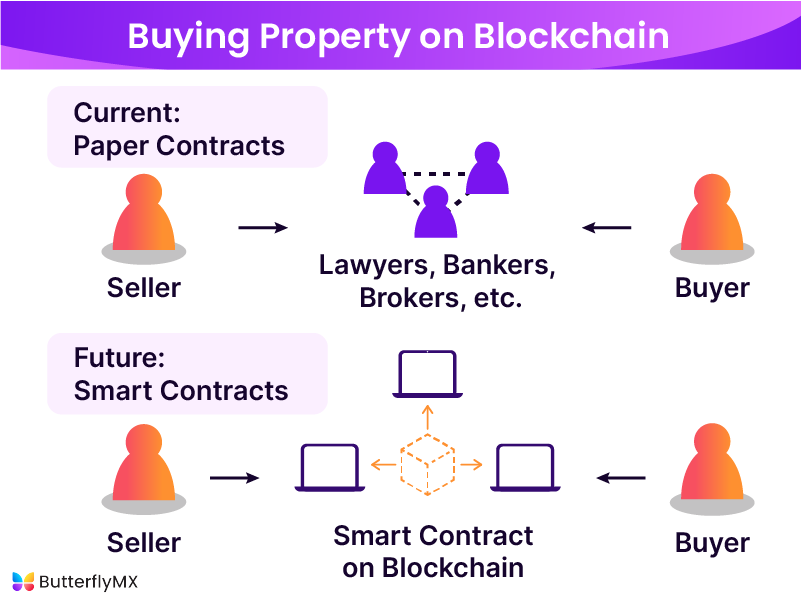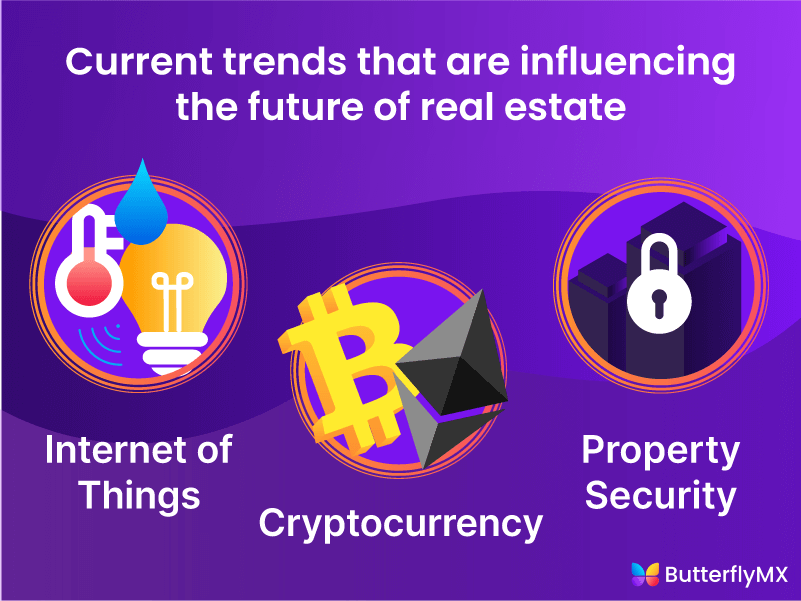Key takeaways
- Non-fungible tokens (NFTs) are a type of digital currency that is unique and non-replicable
- Bitcoin is an example of fungible tokens, which are identical and can be divided
- Blockchain is a specific type of secure database
- The real estate industry can use blockchain technology in three key ways
- Each person involved in a real estate transaction can benefit from blockchain technology
- The industry is already heading into a blockchain-based future
- Invest in property technology to prepare for this revolution

By now, you’ve probably heard of the non-fungible token (NFT) trend. In simplest terms, an NFT is a type of digital currency that is unique and not replicable. The metadata of the token contains unique, non-replicable codes. However, amidst NFT becoming a part of the mainstream lexicon, let’s not forget about fungible tokens (FT). You’ve definitely heard of FTs at least once in the past few years. Cryptocurrency, including Bitcoin, is an example of fungible tokens, meaning that all tokens are identical and can be divided.
Blockchains have been around long before the recent NFT trend. In fact, property owners and investors often use blockchain and real estate in the same sentence. In the coming years, blockchain and other property technology will radically change how we develop, buy, own, and invest in commercial real estate.
Read on to learn:
- What is blockchain?
- How is blockchain useful in real estate?
- How property owners and developers can benefit from blockchain technology
- What does this mean for the future of real estate?
- How to prepare for this next big thing in real estate
What is blockchain?
First, you do not need a computer science degree to understand blockchains. So just keep on reading – we’ll explain it in a way that anyone can understand.
You may wonder, “isn’t blockchain the same thing as a database?” Well, they both serve the same purpose of storing data. However, blockchains have different encryptions that give them a more robust security system than databases. Databases are easy to change and hack. Meanwhile, the information on blockchains is permanent once the data is inputted into them.

Let’s break it down a little further. A blockchain collects related information and groups them together – also known as “blocks” that hold data sets. Each block has a specific storage limit. Once a block is full, it gets chained onto the previously filled block. That creates a chain of blocks with data – hence, the name “blockchain.” The chain around the blocks makes the data unchangeable and indestructible. And since this data is then distributed with a network of computers, the chain creates a verifiable ledger of transactions that anyone can review without being able to alter. That’s how blockchains differ from databases, which just store data in tables, often without secured encryptions.
Both non-fungible and fungible tokens live on blockchains. A blockchain is a system of recording information and storing data in a way that makes it nearly impossible to change or hack. Think of blockchains as digital records of transactions. And those transactions are distributed across a network of computer systems on a particular blockchain.
The difference between bitcoin, cryptocurrency, and blockchain
Bitcoin, cryptocurrency, and blockchain – how are they different, and how are they related?
First, bitcoin is a type of cryptocurrency, a digital currency used to facilitate transactions. Each type of cryptocurrency has its own unique set of codes. Similar to casino chips, you’ll need to exchange actual money (like USD) for cryptocurrency to purchase goods and services from a company. Currently, there are over 6,700 different cryptocurrencies. Bitcoin is just one of them.
Blockchains make it possible for cryptocurrencies to exist.
The data stored on blockchains for a particular cryptocurrency does three things:
- Verifies its value
- Manages and records transactions
- Facilitates the value conversions (i.e., USD to bitcoin rate)
Heightened security is one of the biggest appeals of blockchains and cryptocurrencies. Buying and selling a good or service with cryptocurrencies eliminates the need for central banks, making it more of a direct payment system. Read on to learn about how all of this relates to real estate.
Turning real-life assets – such as bonds, artwork, and real estate – into secure and encrypted digital assets is tokenization. Like cryptocurrency and title registration, tokens contain ownership rights, rules, and transactional history. After tokenization, the asset is divided into multiple pieces. So, various people can own parts of a token.
How is blockchain useful in real estate?
There are many benefits of using blockchain technology in real estate. From title transfers to price negotiations, blockchain technology offers a simple and secure way to perform complex real estate transactions.
Consider how in recent years, apartment tours have gone digital. You can schedule a self-guided tour and view an apartment without talking to a leasing agent. Similarly, blockchain technology digitalizes and simplifies many steps of purchasing a property by providing secure and virtual solutions.
A brief history of blockchain technology in real estate
Since the 1910s, real estate agents have acted as middlemen between the seller and buyer. Having the agent facilitate the property transaction helps establish a level of trust between the two parties. The agent is an expert on the local laws and regulations. So they can confirm that the seller actually owns the property and the buyer has the funds to buy it. To this day, the industry uses the same tactics and practices.
However, blockchain is slowly but steadily transforming the process. On January 9, 2009, a group of people (or an individual – no one knows for sure) under the pseudonym Satoshi Nakamoto released the very first version of bitcoin, and subsequently, blockchain database. Nine years later, in February 2018, America oversaw its first-ever blockchain real estate transaction in Vermont.
The transaction was part of a pilot program with Propy. Propy is a San Francisco-based startup that allows anyone to buy or sell real estate completely online from anywhere in the world. Its blockchain technology records each step in a real estate transaction, from expressing the initial interests to signing contracts to transferring ownership titles.
What lies ahead?
Although still in its infancy, using blockchain in real estate is exciting and full of possibilities. Several startups, such as Redfin and Propy, are already transforming all real estate transactions to be entirely digital. By doing so, these tech-enabled brokerages reduce the costs of intermediaries – including realtors and bankers – by eliminating the need for paperwork, audits, and insurance whenever possible.
Here are three exciting ways that blockchain will enhance the real estate industry:
- Blockchain-based smart contracts
- Making property investing accessible
- Property listing services that are transparent and secure

1. Blockchain-based smart contracts
A smart contract is a self-executing contract outlining the terms of the agreement between buyer and seller. The terms are written into lines of codes that are stored across a distributed and decentralized blockchain network. The blockchain codes monitor the execution of the contract, and such transactions are trackable and irreversible.
Listing agreements, letters of intent, offer sheets, and closing documents are examples of contracts that can become digitized on blockchains. Signing smart contracts instead of paper contracts can significantly speed up the whole transaction process. It also eliminates the need to meet and negotiate with brokers, bankers, and lawyers while ensuring peace of mind that the transactions are secure and legitimate.
2. Making property investment accessible
Real estate investing has long been exclusionary and time-consuming. Whether you’re investing in a single-family home or a multi-building property, you need to involve multiple parties in the due diligence process. You also need to be well off financially to even think about investing in a property.
With blockchain technology, multiple people can buy tokens of a particular property and co-own the building. This is the tokenization of a property, allowing fractional or partial ownership of the asset. Tokenization also allows real estate to be a more liquid commodity, meaning that owners can easily buy or sell their shares cheaper and faster. Therefore, this process attracts more potential investors and buyers in the real estate market by democratizing and decentralizing it.
3. Property listing services that are transparent and secure
Most property listing services available today are privately owned and don’t have a centralized database for cross-referencing. Real estate is historically a “pen and pencil” business, often relying on old and inefficient methods to keep track of transactions and records. Even worse, those services often require users to pay hefty subscription fees.
However, moving those property listing services to a single decentralized blockchain-based server creates a uniform and secured database accessible to everyone. For example, prospects can use decentralized finance (DeFi) services to make unbiased investments or purchasing decisions. Also, since the data is vetted and stored securely, third parties can’t interfere with it by inflating the price or listing fraudulent information.
How you can benefit from blockchain technology
We’ve discussed the potential benefits of blockchain technology in real estate. Now, let’s go over how you – whether you’re a property owner, investor, developer, manager, or even a resident – can benefit from it.
Blockchain technology has big implications for:
Property developers
When multiple parties can invest in a development project, developers can raise the funds needed to start the project faster and more efficiently. Although fractionalization in real estate is nothing new, blockchain technology streamlines the process and casts a wider net for potential investors. Sponsors of the project can solicit capital contributions from investors outside their immediate network without worrying about vetting them or completing massive loads of paperwork. Blockchain records all the data, facilitates the signing of smart contracts, and issues briefings and updates to all involved parties.
What’s more, blockchain securely stores all architectural documents, engineering plans, appliance manuals, and other information. This means that if investors, owners, or anyone else involved in the development project want to access those materials, the data is readily available on the blockchain system. This significantly reduces transaction time and costs, allowing developers to focus on the project’s actual development.
Property owners and investors
Since blockchain technology makes falsifying or corrupting data nearly impossible, potential owners and investors can have peace of mind when buying real estate. In short, when they’re putting their money into a property, they can rest assured that the price and legitimacy are transparent and accurate.
Furthermore, the tokenization of real estate – converting its value into crypto – liquidates the industry. Liquidation makes the entry point for potential buyers or investors more accessible. This means that a seller doesn’t need to wait for a buyer who can afford the entire property to get returns on the investment.
Residents and tenants
From taking virtual tours and signing leases with smart contracts to submitting rent payments or making maintenance requests, renters enjoy a better leasing and living experience with blockchain. Blockchain technology secures these features, so all parties involved know the property listing is legitimate, identities are verified, and personal information is encrypted.
With blockchain, moving cross-country – even across the world – has never been easier. You can lease a property in San Francisco and negotiate deals from Tokyo without stepping foot outside, since blockchain eliminates geographical barriers and prevents privacy and data breaches.
Watch how ButterflyMX self-guided tours work:
Property managers
Today, property management encompasses far more than just applying a fresh coat of paint or upgrading the appliances. A bulk of the job entails processing paperwork, whether for lease agreements or maintenance requests.
However, when you use a single decentralized property management system based on blockchain, all that paperwork becomes smart contracts that are nearly error-proof. A blockchain-based system provides fully transparent information on rental value, payment frequency, tenant and property history, and contractor agreements.
Should you accept rent payment in blockchain?
Although cryptocurrency has yet to be adopted in the mainstream real estate industry, some companies are using blockchain technology to record rent and other related transactions.
Cash and checks still have a very strong grip on the industry, as even the adoption of online payments for rent has been slow. In recent years, select condos and luxury buildings have accepted bitcoin for payment, but we are not at the point where residents pay rent entirely in cryptocurrency. Even as a handful of apps – such as ManageGo – have made it possible for tenants to pay rent with crypto, the currency is simply converted into U.S. dollars.
How blockchain technology can prevent subleasing
One of a property manager’s biggest headaches is dealing with tenants illegally subletting their properties or units, violating their contracts’ terms and conditions.
Since there is currently no decentralization of property listing information, tenants can easily post their homes for subleases without managers ever knowing. However, with a blockchain-based property listing service, a tenant wouldn’t get away with subleasing because the system will automatically flag the illegal listing.
What does this mean for the future of real estate?
Blockchain has the potential to revolutionize every aspect of the real estate industry. It is, frankly, a disruptive innovation that will change the roles of players in the sector.
However, every other technological advancement initially seemed far-fetched or impossible. For example, consider smartphones. Just 20 or so years ago you couldn’t imagine you’d have the world wide web in your pocket at all times. Or, that such a device could turn on the car, unlock your apartment door, or buy items.

Real estate has a bright and exciting future ahead, thanks to blockchain. Here are some ways that current trends will influence the future of real estate:
- The increasing popularity of cryptocurrency
- The continuous growth of the Internet of Things
- Increased property security
The increasing popularity of cryptocurrency
As we’ve seen with the recent NFT trend, more and more people are becoming interested in the world of cryptocurrency. As digital wallets — such as Apple Pay, Google Pay, and Samsung Pay — become the new norm, cryptos will be even more relevant. Digital wallets already use a component of blockchain technology as a unique token is assigned to them, which prevents merchants from seeing your credit card number. A blockchain-based database stores the token, which eliminates the possibility of data theft.
It won’t be surprising if more and more people want an extra layer of security for the currency itself to prevent fraud by financial institutions. Since cryptocurrency is decentralized, people may feel safer using cryptos when paying with virtual credit cards, especially for big transactions like real estate investments.
The continuous growth of the Internet of Things
Today, everything lives on the internet. From package tracking information to your biometrics, the Internet of Things (IoT) enables the world.
IoT devices exchange data with one another and adapt to new situations. For example, IoT allows your smartphone to act as a key to your apartment door by connecting with an intercom or smart lock. Other smart technology has modernized ways of living, such as smart refrigerators that automatically generate grocery lists and smart thermostats that keep your home at the perfect temperature.
However, there has yet to be a mass-scale security solution for these devices. As people put more and more information onto the internet, blockchain will become an integral part of the scalability and security solution. And as the real estate industry adapts to and implements these technologies, the need for blockchain technology will only increase.
Increased property security
From listing a property to buying it, every facet of real estate requires a robust security system. As discussed earlier, blockchain technology ensures accurate, safe, and fast real estate transactions.
Going one step further, property security systems — like gate or door openers and video surveillance — that use blockchain technology will be impossible to hack or hamper. As a result, fewer property break-ins will occur and security footage will be impossible to destroy, keeping all property crimes at bay.
How to prepare for this next big thing in real estate
In this post, we discussed how blockchain will – and already is – reshaping the real estate industry. But you might feel stuck as to what to do right now to adapt to such a technologically advancing world.
Tech legend Bill Gates once said, “We always overestimate the change that will occur in the next two years and underestimate the change that will occur in the next ten. Don’t let yourself be lulled into inaction.”
There are tangible ways you can prepare for the expected tech overhaul in real estate. One is to invest in existing proptech.
Invest in proptech
Investing in proptech will help your property adapt more quickly to the blockchain-enabled future. Since proptech devices like smart home technology and smart video intercoms are already internet-connected, most resident and property information can easily be transferred onto a secure blockchain. Installing proptech throughout your property will put you ahead of the competition.
With blockchain technology, all proptech devices and property management systems will be integrated and operate under the umbrella of one database. All your devices will talk with each other and verify information instantaneously without additional programming. This allows you to seamlessly integrate all the moving parts of real estate.
